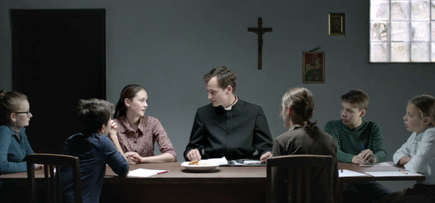One of the students that leaves the gathering is Maria (Lea van Acken), an elfin girl possessed of a quiet sadness. The eldest child from a family led by a fervent mother (Franziska Weisz) and a passive father (Klaus Michael Kamp), Maria suffers the brunt of her mother’s exhortations to lead a godly life, though there’s no evidence presented that she isn’t doing this to the utmost. Out of a desire to please her mother, do her duty to god, and maybe even get a miracle performed for her mute toddler brother, she firmly grabs onto the priest’s message of sacrifice. She refuses to wear a coat on nature walks with her family or smile in a picture, giving up warmth and contentment for Jesus. When a boy (Moritz Knapp) talks to her about his more liberal church and she doesn’t immediately dissuade him from conversing, the self-flagellation only gets worse, especially after confessing this supposed sin to the priest, who shames her for impure thoughts in herself and for potentially causing them in the boy.
The extremity of the emotional abuse that Maria is put through makes Stations of the Cross an exercise in sadism. There’s no other word for this belief system. Happiness can be generated by something as harmless as a clever turn of phrase or a landscape or a task well done, and the members of this particular sect would frame that happiness as selfish. Jesus died for you, you ingrate, and you’re going to smile? Satan’s an active force in the world and uses natural and man-made beauty for his own ends, and you’re going to take pleasure in its majesty? Sinner. Stick with the sect-approved forms of activity, and let us be the gatekeepers of all things good. Watching a belief system act like a prison, seeing tenets form as bars of a cage, and then doing the mental calculus to imagine how difficult it would be to dismantle that kind of conditioning forms the backbone of several personal favorites. Stories about cults always entertain, and Stations of the Cross, as intense and tragic as it is, is no exception.
To the family’s credit, Maria isn’t fully blocked off from the rest of the world. The Catholic tradition of interrogation is alive within this sect, and the theological underpinnings of their severity are believed in confidently enough that believers should be able to intellectually defend themselves from those outside the circle. Therefore, they can move amongst the heathens. The family’s au pair (Lucie Aron) depends on the mother’s good graces for income, but she doesn’t believe what her employer do. Maria goes to a secular school, and exposes herself to ridicule when she refuses to participate in calisthenics backed by pop music (the music is satanic). Her interactions with the boy are where her beliefs are most questioned. He’s earnest and curious about Maria, and she’s susceptible to his charms both as a self-conscious teen and as someone happy to explain herself to others. She doesn’t have a good answer to why girls can’t be servers during church, but she’s rock-solid on the whole ‘happiness is wrong’ ethic. That there are counter-examples to how Maria could be living only makes her continued resistance all the more painful.
As a former Catholic, there’s plenty to recognize in Stations of the Cross. Many a Good Friday service was accompanied by bloody recreations of the crucifixion, with the accompanying screams by actors that parishes enlisted to play the part of Jesus. It always seemed such a strange part of Jesus’ life to fixate on. The Romans crucified thousands, if not hundreds of thousands, of people. The glorification of suffering, which is at the center of Maria’s sect, is a direct outgrowth of that fixation and remains a despicable philosophy. Bruggeman’s dense and impactful film shows how badly it warps a forming mind, while also turning life into a drudgery devoid of joy. Seeing such a well-crafted and coherent work, as depressing as it is, is exactly the kind of jolt of happiness that Maria would futilely shun. B+

 RSS Feed
RSS Feed